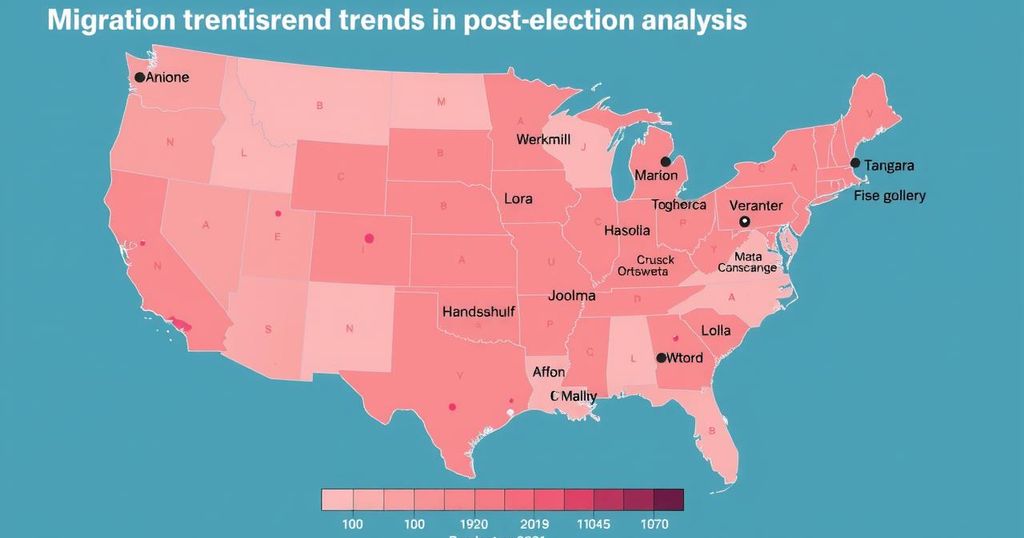The 2024 presidential election will influence U.S. migration policy, with a marked shift in public opinion favoring reduced immigration. Various crises have drawn attention to asylum rights, but misinformation has clouded the discourse. Comprehensive immigration reform is urgently needed to address labor shortages and family reunification while navigating a landscape of potentially restrictive new policies. Advocacy and informed public sentiment are essential for shaping humane immigration policies.
The aftermath of the 2024 presidential election is poised to reshape national migration policy in the coming months, necessitating an examination of the factors that propelled migration issues to the forefront of public debate. Over the past four years, the American public has exhibited a notable shift in perception regarding immigration, with a Gallup poll indicating that 28 percent of respondents in 2020 supported reduced immigration, which soared to 55 percent by 2024—the highest since 2001.
This dramatic change can be attributed to various elements, particularly the political discourse that painted immigration as a crisis. While recent surges in migrants from Venezuela and Central America amplified fears, the actual number of arrivals was not unprecedented compared to historical migration levels. It is imperative to remember that the right to asylum, enshrined in both international and domestic law, mandates that individuals fleeing persecution be granted the opportunity to seek protection.
Unfortunately, many migrants availed themselves of this right due to multiple push factors, albeit few were able to substantiate their claims of persecution effectively. Moreover, systemic backlogs in the asylum review process further compounded the challenges, prolonging migrants’ wait times for assistance. The relocation of migrants to Democratic strongholds by certain Republican governors highlighted public awareness—often fueled by misinformation—around the immigration issue.
Recent upheavals in regions such as Haiti, Ukraine, and Afghanistan, which occurred in rapid succession, led to the granting of Temporary Protected Status or humanitarian parole to migrants from these countries. This collective crisis significantly impacted U.S. migration policy, underscoring the influence of public sentiment on the policy-making process in democracies, often at the expense of comprehensive examination and understanding of migration dynamics.
The incoming administration’s pledges, such as ramping up deportations and terminating protections for certain youth migrants, have raised significant concerns regarding future reforms in immigration policy. As the nation grapples with the implications of these policies, it remains critical to prioritize humane and sensible responses that align with national interests and moral imperatives. A thorough reform of the immigration system is urgently needed, given its stagnation since 1965, to address workforce demands and promote family unity without perpetuating human suffering.
In light of ongoing developments, there is a pressing need for advocacy that influences public opinion favorably. Understanding the complex socio-political landscape surrounding migration is essential for fostering compassionate and effective policies that consider the realities faced by migrants and the nation as a whole.
The topic of migration in the United States has increasingly become a focal point of political discourse, especially following the 2024 presidential election. Historical patterns show that shifts in migration policy often reflect broader societal attitudes rather than rigorous analysis. The growing public sentiment against immigration has raised concerns regarding the treatment and rights of migrants, particularly in the context of asylum seekers and individuals benefiting from protective statuses due to crises in their home countries. A confluence of political rhetoric and real-world events has catalyzed a reconsideration of the nation’s immigration frameworks; thus, understanding these dynamics is vital for shaping future policy effectively.
The examination of post-election migration perspectives reveals that public sentiment significantly sways policy formation, impacting the rights and treatment of migrants in the United States. The pressing need for comprehensive immigration reform cannot be overstated, especially as restrictive policies may exacerbate human suffering. It is crucial to cultivate informed public opinion that advocates for humane policies reflective of national needs while addressing workforce shortages and family reunification issues. Ultimately, the future of immigration in this country hinges on balanced dialogue and sensible legislative measures that honor both our humanitarian obligations and economic realities.
Original Source: www.miamiarch.org






